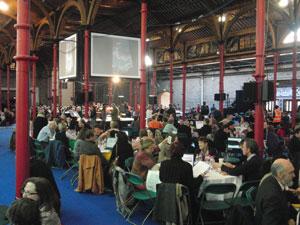Claiming Our Future - a participant's view

Something interesting happened in Dublin on Saturday 30, October 2010. It is not yet clear whether what happened was important. But it was interesting nonetheless. By Eoin Ó Broin
More than 1,000 people from all over Ireland gathered in the Industries Hall at the RDS to participate in an event called Claiming Our Future.
There were community and voluntary sector workers, trade unionists, environmentalists, party political activists, campaigners, the self-employed, the unemployed and individual citizens.
There were people from all across the country, of different ages and nationalities, with different political and ideological orientations.
What united those in attendance was dissatisfaction with the status quo, a desire for change, and a determination to play some part in bringing that change about.
Claiming Our Future was the brainchild of a loose collection of individuals operating under the banner of Is Feidir Linn. The aim of the event was to create a space for civic society to deliberate and agree the values, policies and actions required to help bring about an equal, sustainable and thriving Ireland.
Established in 2008 following the publication the Community Platform's report, A Better Ireland Is Possible, Is Feidir Linn describe themselves as 'concerned with community development, social inclusion, anti-poverty and equality issues' and want to explore 'what an alternative economic and social development model for Ireland would look like'.
Is Feidir Linn launched a mini manifesto in June 2009 at the 'Shaping Our Future: developing a vision for an inclusive, equal and sustainable Ireland' conference.
Following the conference Is Feidir Linn embarked on a much more innovative and ambitious project. They sought to provide a space within which a diverse range of civic interests could meet, discuss and if possibly agree actions aimed at building a movement for social and economic change.
Is Feidir Linn joined forces with The Community Platform, The Irish Congress of Trade Unions, Social Justice Ireland and TASC and launched Claiming Our Future, A Progressive Movement for an Equal, Sustainable and Thriving Ireland.
The event itself was both highly innovative and incredibly simple. One hundred tables of 10 people discussed the values, policies and actions needed to realise the event's title. The discussions on values and policies were framed with ideas and proposals developed by the organisers. The discussion on actions was left open. Attendees were also given the possibility of proposing alternative values and ideas.
Each table discussed and attempted to reach a consensus on key values, preferred policy options and suggested actions. These were then entered into an on-line voting system via a laptop on each of the tables. The results from all the tables were collated and announced after each session.
The table at which I sat comprised four men and four women. The age profile ranged from the mid 30s to mid 60s. All but one, from Co Cork, were resident in Dublin. All but one, from the Netherlands, were born in Ireland.
A self-employed businesswoman formerly involved with the Progressive Democrats was angry at the state of the country. A veteran left wing trade unionist and campaigner called for rebellion. There was a mother from farming stock concerned about the state of rural Ireland and deeply frustrated at the political system. There was a young service sector trade union organiser concerned with jobs and indigenous economic development. There was a men's development worker whose work life brings him into contact with many of the city's most marginalised men. There was a Jesuit campaigner for justice working with communities and families living in poverty. There was a care worker active in the Green Party and disillusioned with their performance in government.
And there was me, a Sinn Féin activist committed to social, economic and political change.
We agreed that the values of participation, solidarity, environmental sustainability, justice and enterprise were most important to us as a group.
We wanted a new development model that balanced economic security with social and environmental sustainability. We wanted a Nordic level of taxation. We wanted our political institutions to be more accountable, equal and efficient. We wanted universal access to healthcare, childcare and services for older people.
To promote these values and ideas we suggested holding local Claiming Our Future events engaging people door to door and in town hall meetings. We suggested a youth Claiming Our Future organised by and for 15 to 25 year olds. We wanted to engage the political system to secure influence over a future progressive Programme for Government. We wanted civic society to pick specific tangible goals and mobilise in support of these. And we wanted to promote our new economic and social model through the media.
The day was long and tiring, but also positive. The discussions were interspersed with songs by Mary Coughlan, rap from Ballymun's Miracles Happen and ballads by Shaz Oye.
As the dulcet tones of the Gloria lesbian and gay men's choir sang Labi Saffri's Something Inside So Strong at the events conclusion, we could hear other tables asking themselves the same question we were asking; 'Will anything actually come from today's discussions and decisions?'
Of course the answer lies with us. If we want to see a broad based civic movement for a more equal, sustainable and thriving Ireland then we will have to build that movement ourselves. When we return to our community and voluntary organisations, trade unions and political parties, campaign groups, workplaces and families we will have to spread the word that alternatives are available, that change is possible, and that the status quo doesn't have to remain.
Claiming Our Future was a good event. It was democratic, inclusive, diverse and progressive. If it is to become anything more than an interesting Saturday spent in the RDS then those of us who see its potential will have to take the initiative and join in. If we do that then maybe, just maybe, it could become something truly important.
